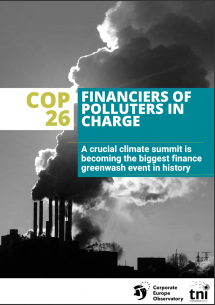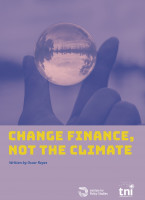COP26: Financiers of polluters in charge A crucial climate summit is becoming the biggest finance greenwash in history
This report unpacks the spin of Net.Zero and explains how big corporations have hijacked the decision-making table at global government level.

Authors
Download the full report here.
At the climate summit in Glasgow, delegates will for the first time consider how to reform financial markets to ensure that financial flows are “consistent with a pathway towards low greenhouse gas emissions and climate resilient development.” The current proposal on the table, though, is not for governments to embark on an ambitious reform process to prevent financial firms from making investments that endanger the future of the planet.
The 31 page proposal on Private Finance, authored for COP26 by Mark Carney, special advisor to the UK Prime Minister and to the UN Secretary General, is based on ideas developed by the big players on financial markets themselves. It is no surprise then that self-regulation is at the heart of the proposals. But it gets worse. Not only have the proposals been developed by the likes of JP Morgan Chase, BlackRock, BNP Paribas and other financial firms with a heavy engagement in fossil fuels, but many of these same firms will also be leading the follow-up to COP26. In fact, as things stand, governments are not called on to do anything of substance on private finance and climate after the summit – financial firms will take it from here.
The ticket for financial firms to become part of the coalition that will lead the COP26 follow-up is a commitment to “net zero by 2050”, ie. carbon neutrality three decades from now. The vagueness of this commitment leaves the door wide open to convenient loopholes, and for corporations to do little or nothing to reduce their carbon emissions for years to come. In sum, even if a financial firm continues to invest massively in fossil fuels, it can still be actively included in the UN agenda on private finance and climate change.
Sadly, COP26 looks set to become the biggest finance greenwash event in history where the trend of corporate capture of the multilateral system of the UN reaches a new level.
Context
When the Paris Agreement was concluded in December 2015, one sentence was of great interest to the people running big banks and investment funds. According to article 2.1 c of the agreement, the signatories should now set out to make “financial flows consistent with a pathway towards low greenhouse gas emissions and climate resilient development.” This commitment was not just about public funding for sustainable projects. Though unclear, it was potentially about a revamp of financial markets that would force a flood of money away from projects that could undermine the target to limit global warming to 1.5 degrees rise in temperature. This objective would seem to rule out any investment in new fossil fuel projects - the basic fundamentals of the financial sector’s approach to business were theoretically on the line.
Now, almost six years later, the issue has for the first time reached the top of the agenda of the recurring climate summits (the Conference of the Parties to the agreement), with COP26 taking place in Glasgow in November 2021. The decisions taken at the meeting in Scotland will determine how the Paris Agreement is implemented regarding financial flows on financial markets, and what role the big financial corporations that run global financial markets will come to play in the future. But even before the gathering has begun, it is clear that little, if anything, has made it through to the COP26 agenda that could displease the financial sector.
Since the agreement in Paris in late 2015, different constellations of financial corporations have worked to define methods for banks, investment funds, insurance companies and others to address the threat of a deeper climate crisis. Much of this work now, controversially, forms part of the official UN process. Not only this, but the corporations have been invited in not just to contribute to the event, but in fact to take over the implementation of the UN agenda on private finance and climate change. When the light is turned off and the doors are shut at the conclusion of COP26, the likes of BlackRock, Bank of America, Citigroup and Santander will take it from there.
This turn of events should not come as a surprise, perhaps. For decades now, the UN system has seen an increasing trend of forming alliances with all kinds of big business groups, depending on the agenda. On climate change we find the Race to Zero campaign at the heart of an effort to involve businesses directly in international decision-making, and more specifically on the oil and gas industry, there is the Oil and Gas Methane Partnership. This approach, sometimes dubbed multistakeholderism (or corporate multistakeholderism), has now reached the private finance agenda of the global climate change talks, and it is taken to extremes.
In some quarters there will be nods of appreciation when COP26 sees a parade of financial corporations committing to “net zero by 2050”. Hundreds of financial institutions have signed up to UN-convened coalitions of companies promising to do their bit to fight climate change. But there are three serious problems with this approach: first, the commitments are so vague that they open the door to a potentially massive greenwash. Banks, asset managers and investment funds with massive holdings in fossil fuels and no concrete ambitions to change course can exploit the UN’s programme to strengthen their image. Second, there is a risk that the presence of private finance in the overall architecture will be used by high-income countries to scale down their own financial commitments. Third, the corporations are not only signing up to statements and making commitments, they are in fact taking over the whole show.
At the heart of the private finance agenda at COP26, we find ideas developed specifically for the conference by Mark Carney, the Special Envoy of both UN Secretary General Antonio Guterres and UK Prime Minister Boris Johnson. The 31 pages document outlining Carney’s policy proposals, called “Building a private finance system for net zero” will be analysed in this briefing. Alarmingly, it will leave the initiative to the very big banks and asset managers whose investments helped to bring about climate change in the first place. In other words, financial corporations are not being required to quickly change track in any meaningful way.
When the light is turned off and the doors are shut at the conclusion of COP26, the likes of BlackRock, Bank of America, Citigroup and Santander will take it from there.
In fact, the commitments they have made in order to gain access to the circle of power around climate change and finance are so vague that even the world’s top fossil fuel bank, JP Morgan Chase, joined the UN convened net zero coalition only weeks before COP26. The bank supports “the ambition for greater climate action, the sharing of best practices and a collaborative approach between the public and private sectors to reach this goal,” a representative for JP Morgan Chase said.2 Had this been the outcome of a genuine change of approach by the bank, or indeed any of the other major financiers of significantly harmful activities that are members of the growing coalition behind the private finance agenda at COP26, it would be interesting. But looking closely at what is on the table, and how little financial institutions are committing to, the excitement vanishes: COP26 looks like it may turn out to be the biggest finance greenwash event in history.
While there will be little or no talk about the urgent need to divest from fossil fuels, there is already a lot of excitement about the prospect of what Mark Carney - one of the key protagonists promoting this agenda – calls “one of the greatest commercial opportunities of our time.” This message is not lost on JP Morgan Chase and the likes: “Companies that can get ahead of impending climate-change initiatives and work with governments to achieve their goals may benefit from first- mover advantage.” 3 Such statements offer a reminder about the fundamental goals of financial corporations, and the breadth of their vision. These companies aim to maximise returns, and to avert any obstacle to their hunt for profits These corporate led initiatives show no sign of taking meaningful steps to deal with the environmentally dangerous role and impact of private finance. To avert a climate disaster we would need swift action from the finance sector to divest and to stop further harmful investments.
It would seem strikingly obvious that to put the likes of JP Morgan Chase, BlackRock, BNP Paribas and many more financial actors that have a significant stake in carbon-generating activities worldwide at the steering wheel of the global effort on private finance and climate change is to let the fox guard the henhouse. Yet, that is what is happening.
Broader UN trend: corporations hijack global governance
Major trends are converging in Glasgow that bear witness to a broader, deeply worrying transformation of the UN. First, there has been a steady advance of the phenomenon of corporate multistakeholderism - putting transnational corporations at the centre of solutions to the current intersecting global crises brought about by neoliberal globalisation of the economy and politics. At the same time, the UN system has been weakened – with many governments failing to deliver on financial obligations. We have also seen the steady erosion of the binding human rights regime, which has tolerated corporate impunity and substituted voluntary corporate social responsibility in the place of accountability.
This has allowed corporations to advance their positioning through public-private partnerships, and to act with impunity while corporate privilege was copper-fastened through the prescriptions of trade and investment treaties (via the ISDS regime of corporate arbitration courts) and the World Trade Organization, International Monetary Fund and World Bank. At the same time, the UN Global Compact was established a non-binding pact initiated by then UN Secretary General Kofi Anan in 20008 which gave privileged UN access to Corporations. Despite significant contestation and resistance to these developments over the past decades, these accumulated trends have culminated in the forthcoming summit in Glasgow. In the coming weeks we are likely to witness COP 26 being an iconic instance of a privatized multistakeholder space where the financial corporations dominate the agenda and confirm and promote a joint UN-corporate roadmap for the climate.
While the multistakeholder strategies have evolved within the specificities of each industrial and financial “sector”, an analytical mapping of 103 multistakeholder initiatives commissioned by Transnational Institute and Friends of the Earth International, has shown common trends and modalities being used by big business.9 Transnational corporations and mega-philanthrophes have hijacked global governance, with the World Economic Forum as a main actor in driving this privatisation.
This is in line with the general rise of corporate power and its advance into the arenas of the multilateral system. The years between 2000-2020 saw an acceleration of this process. The analysis of the 103 multistakeholder initiatives set up during this period revealed common trends in setting goals and modes of operation, ensuring that it is the corporations, not the states, that make the key decisions.




